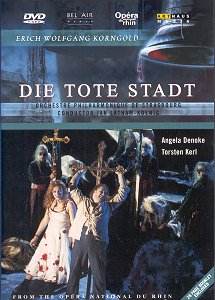Erich Wolfgang Korngold was one of the most prodigious
talents of his generation. No lesser light than Richard Strauss hailed
compositions by the then eleven-year-old composer as perfect. When at
age twenty-three, his first full scale opera opened in not one, but
two major opera houses, it was nothing short of sensational. Although
he would become both famous and rich in Hollywood composing film scores
for such classic pictures as Anthony Adverse and The Seahawk,
Korngold left behind a considerable output of serious scores. With a
penchant for lush harmonic textures (he highly favored sharp keys, frequently
going as far afield as f-sharp and c-sharp major) and for colorful orchestration,
he was a natural for the big epic movies that he scored.
The opera Die Tote Stadt, based on the 1892
cult novel Bruges-la-morte by Georges Rodenbach is a sadly underplayed
masterpiece. Banned by the Nazi regime, it lay dormant for many years
in spite of its initial successes. Erich Leinsdorf resurrected it in
the sixties, and recorded the work with René Kollo and Carol
Van Ness, and this remains the only studio produced recording of the
work on the market. (Naxos has a live version in its catalogue, but
its hit and miss vocal casting is a detriment.) In addition to its colorful
orchestral writing and captivating "in and out of reality"
plot design, this opera is possessed of one of, if not the most beautiful
romantic aria in the repertoire. Marietta’s Lied from act one,
later reprised by Paul at the finale is one of the most hauntingly memorable
operatic tunes ever composed.
This production, which owes homage to expressionist
film-makers the likes of Walter Reimann and Walter Rohrig (The Cabinet
of Dr. Caligari), and Fritz Lang (M, Metropolis) is an effective
portrayal of the psychological turmoil that afflicts our protagonist
Paul, who is obsessed with the memory of his dead wife. The lapses between
the world of dreams and reality overlap at will, and the spectator can
become confused if he has a short attention span. Set, lighting and
costume design are brilliant here and the quality of the picture reproduction
on this DVD is astounding. Particularly noteworthy is the set design
of the bar scene in Act two, where Marietta and her theatrical cohorts
reenact a scene pattered after Meyerbeer’s Robert le diable.
In a very Caligari-esque move, set designer Charles Edwards creates
a scene that is out of balance with a bar that slants downward and tables
and chairs that are out of proportion. Magali Gerberon’s magnificently
outrageous costumes cap off a scene that is gripping and interesting
from the get go.
Of course, what is opera without fine singing? Not
to fear, we get it here in abundance. Torsten Kerl is superb as the
tormented Paul. His is a large but not unwieldy voice that is capable
of absolutely radiant beauty. He has magnificent control over his high
register and can sing a messa di voce that would be the envy
of any baroque specialist. There is a tendency for him to employ the
old big tenor "hook and push" when he sings forte passages,
and this becomes an annoyance from time to time. Overall however, his
singing is outstanding, and his portrayal of the character is believable
albeit a bit over the top at times.
Angela Denoke is also possessed of a rich lyric sound
with ample heft to keep up with both her stage mates and the huge Korngold
orchestra. Her portrayal of the flirtatious Marietta is wonderful to
watch. If one could quibble at all, it would be to say that her enunciation
leaves something to be desired, and one tires of hearing her distort
vowels beyond recognition, particularly when she is in her upper register.
Taking into consideration the formidable length of the role and the
amount of energy it must take to keep up such strong singing over so
large an orchestra, one can hardly blame the poor woman for the occasional
vowel alteration.
The other singing standout is Stephan Genz, whose Act
II Pierrot’s Tanzlied is ravishing. Yuri Batukov’s Frank is well
sung, but his character(s) are not particularly memorable. The Strasbourg
Orchestra is phenomenal, and Jan Latham-Koenig is a conductor whose
career will hopefully soon gain more international recognition. An excellently
detailed program note enhances this already fine production. Why, I
wonder, are there no libretti in DVD opera productions? This would be
a good addition.
For fans of big romantic opera, this is a must. Recommended
without hesitation.
Kevin Sutton
see also review
by Ian Lace
